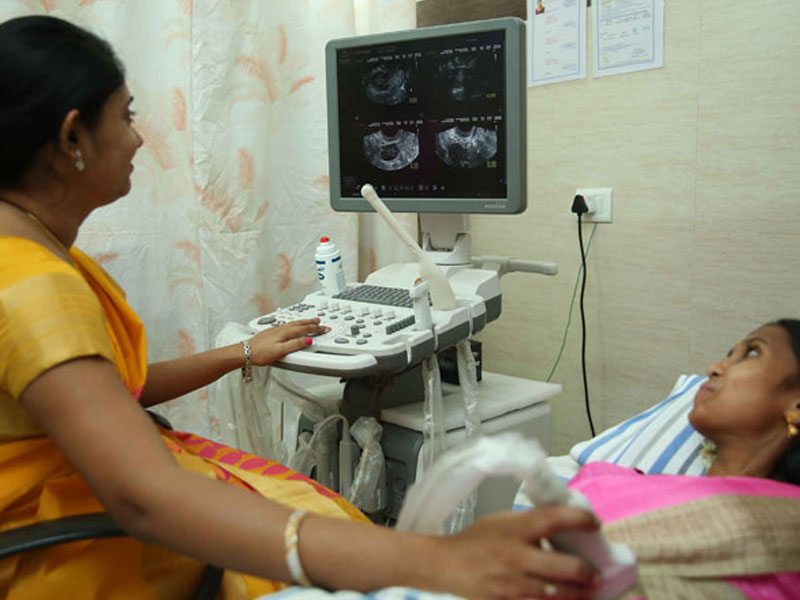
Recurrent Pregnancy Loss Treatment

Recurrent abortion is defined as having two or more miscarriages. After three repeated miscarriages, it is the inability to conceive. A Pregnancy loss with a clinically-recognized Pregnancy involuntarily ends before 20 weeks. So it means that the Pregnancy has been viewed on an ultrasound or that Pregnancy tissue was identified after a Pregnancy loss. Know the reasons, symptoms, treatment and prevention methods for Recurrent Abortion at Sakthi Fertility Udumalpet, Coimbatore, and Tamilnadu.
Genetic problem
Most Abortion (about 50%) occurs when an Embryo receives an abnormal number of Chromosomes during fertilization. This type of Genetic problem happens by a chance, If there is no medical condition that causes it.
Chromosome abnormality
Aneuploidies: it is the defect in the number of Chromosomes - the presence of an extra Chromosome (Trisomy) or a missing Chromosome (monosomy) - resulting from segregation of errors during cell division.
Structural Chromosomal Anomalies
it is the defect in the Chromosome structure. So this is different from numerical anomalies in that they consist of a defect in the structure of 1 or more Chromosomes. Examples: A part of a Chromosome is turned around; a Chromosome forms a ring structure, and the parts of Chromosome in the wrong location.
Advanced Maternal age
Advancing maternal age is one of the reason for an increased risk of miscarriage, which is due to poor egg quality leading to Chromosomal (Genetic) Abnormalities. Sometimes, the father or mother themselves may have a slight irregularity in their genes, so offspring could be very severely affected and thus result in abortion.
Abnormality in the womb
This is one of the causes of Recurrent Pregnancy loss; there could be an abnormality in the uterus that leads to abortion. The Recurrent Abortion may be due to poor blood supply to the Pregnancy or inflammation. Some women may be born with Uterine abnormalities. It is an irregularly shaped uterus, and some women may develop abnormalities with their uterus over the time.
Immune Problem
A low immune power may also play a role in Recurrent Pregnancy Loss.
Hormone Imbalance
It may also impact Pregnancy loss, including Thyroid disease and Diabetes. Abnormalities in a mother's blood clotting may also affect Pregnancy loss.
Others
• Environmental factor
• Occupational factor
• Stress
• Physical illness
Age
Women older than 35 years of age have a higher risk of miscarriage than do younger women has. At age 35, you have about a 25 % risk. At age 40, the risk is about 50% percent. And at age 45, it's about 90% percent.
Previous Miscarriages
Women who have a three or more consecutive abortion are at a higher risk of Miscarriage.
Chronic conditions
Women who have a chronic condition, such as uncontrolled Diabetic mellitus and Thyroid problem, have a higher risk of miscarriage.
Uterine or cervical problems
Certain uterine abnormalities or weak Cervical tissues like incompetent cervix is might to increase the risk of miscarriage.
Smoking, alcohol and illicit drugs
Women who smoke during Pregnancy have a greater risk of miscarriage than do non-smokers. Heavy alcohol and illicit drug use also increase the risk of abortion.
Weight
Being overweight or being underweight has an increased risk of Miscarriage.
Invasive Prenatal test
Sometimes Invasive Prenatal Genetic tests are also affecting your Pregnancy, such as chorionic villus sampling and Amniocentesis, carry a slight risk of miscarriage.
Most abortion occurs before the 12th week of Pregnancy
• Abdomen Pain or cramping
• Fluids or tissue passing from your vagina
• Lower back pain
• Vaginal bleeding
History collection
First, a Health care provider will collect a detailed medical, surgical, family, and genetic history.
Physical examination
Your Health care provider will perform a physical examination. This helps to find out your physical problem.
• Pelvic exam
Your Health care provider might check to see if your cervix has begun to dilate.
Ultrasound
During an Ultrasound, your Physician will check for a fetal heartbeat and to know the embryo development. If a diagnosis can't be made, you need to have another Ultrasound in about a week.
Blood tests
Your Health care provider will check the level of the Pregnancy hormone, Human Chorionic Gonadotropin. If the pattern of changes in your HCG level is abnormal, it indicates a problem. Your Health care provider must check to see if you're Anemic; it could happen if you've experienced significant bleeding and you may also check your blood group type.
Chromosomal tests
If you've had more previous Miscarriages, your Health care provider may order blood tests for both you and your partner to determine if your Chromosomes are a factor.
Tissue tests
If you have tissue passing from vagina, it can be sent to a lab to confirm that a miscarriage has occurred, and that your symptoms are not related to another cause.
Hysterosalpingogram or Hysteroscopy
This test is to make sure that there are no defects in your Uterus (womb).
Medication
If Antiphospolipid Syndrome is diagnosed, specific medications that reduce blood clot formation may be prescribed. If Thyroid Dysfunction or Diabetes is diagnosed, certain medications can be given. For about 60 to 80 percent of women, it will be more effective in this treatment.
Genetic Counseling
If any Chromosomal abnormality is found,they are often referred to Genetic Counseling. There, a specialist discusses about the Genetic Abnormalities and the likelihood of having a Chromosomally normal or abnormal Pregnancy in the future. Some affected couples may choose to undergo Prenatal Genetic studies during Pregnancy to check the genetic make-up of the offspring with either.
1) Chorionic villus sampling, in which a piece of placenta is biopsied late in the first trimester or early in the second trimester.
2) Amniocentesis, which removes some of the Amniotic fluid for analysis.
Surgical treatment: If a Uterine abnormality is found, surgery may be performed depending on the defect.
In Vitro Fertilization (IVF)
In this process, the woman takes shots for several days so that many eggs grow in her ovaries. The eggs are then retrieved from the ovaries in a minor surgical procedure; the sperm will be injected into each egg and the Embryo is allowed to grow. One cell of the Embryo is then biopsied and the Genetic make-up is analyzed to avoid the transfer of an affected Embryo.
We at Sakthi Fertility provide all under one roof. It serves as one of the best centers for Assisted Reproductive Technology treatment in Udumalpet, Coimbatore and many infertile couples are benefitted with our fertility treatment and have a complete family. Sakthi Fertility center has skilled specialists in infertility treatment, Pollution free environment, innovative financing programs, and patient friendly and provides the best services to fulfilthe patient's dream of having a baby. It has treated multiple number of recurrent abortion in Udumalpet, Coimbatore, Tamilnadu, India region.
For More Information: +91 96 26 200 600
Consult Us
We are here to answer any questions about your fertility treatment and we'll respond as soon as we can.
















.png)



.png)
.png)
.png)

.png)
